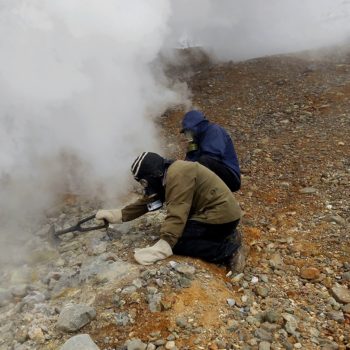Why We Love It
-
$105,720Potential Avg. Salary*
-
Growing DemandJob Outlook
* Salary & growth data is based on the recent Bureau of Labor and Statistics data published at https://www.bls.gov/oes/current/oes192042.htm for 19-2042 Geoscientists, except hydrologists and geographers 11/2021. Based on national data, not school-specific information. Conditions in your area may vary.
Why does the West Coast experience so many earthquakes? How can structures be constructed to resist natural disasters like earthquakes, tornadoes, and tsunamis?
These are the questions you’ll investigate and answer in a bachelor of science in geological engineering program. Geological engineers understand both earth science and engineering concepts to prevent and reduce the damage of natural hazards.
What is a Degree in Geological Engineering?
Civil engineers aid in the design and development of dams, bridges, and other manmade structures. Environmental engineers focus on designing green structures, alternative energies, and other projects related to sustainability.
Geological engineering is often mistaken as some blend of these two disciplines, and while there are aspects of these disciplines in geological engineering, the discipline itself is concerned primarily with understanding the structure of the Earth in order to prevent natural hazards.
In a geological engineering program, you’ll gain the knowledge and skills needed to become a geological engineer. You’ll take courses in geology, geography, engineering, physics, meteorology, and biology, enabling you to function as both an earth and engineering scientist.
You’ll learn how to measure signals to predict natural hazards and disasters, skills that can enable you to thrive in a number of careers, such as meteorologist, petroleum engineer, mining engineer, hydrologist, or environmental engineer.
Recommended Schools
What Courses Would I Take For a Major in Geological Engineering?
- Mineralogy and Petrology for Engineers
- Structural Geology and Tectonics
- Field Geology
- Geological Engineering Design
- Fluid Dynamics of Earth Materials
- Groundwater Modeling
- Solute Transport and Subsurface Remediation
- Stratigraphy and Sedimentary Processes
What Jobs Can You Get with a Degree in Geological Engineering?
Demand for geological engineers is expected to grow as fast as the national average for all jobs, so graduates should be able to find work in their field after graduation.
Additionally, because geological engineering students study topics that span other engineering disciplines—such as civil engineering, environmental engineering, mining engineering, and petroleum engineering—they can qualify as engineers in many other disciplines if specifically geological engineering jobs aren’t available.
How Long does it take?
A bachelors in Geological Engineering will have a typical length of 4 years in a full time schedule. That said, there are many ways to speed up the timeframe by either taking more units via online coursework, community college, or taking free classes at OnlineDegree.com that could transfer to universities in the US.
Recommended Schools
Best Jobs for Geological Engineering Degrees
Geological engineers can work in many different careers in the fields of both engineering and the earth sciences. While many work as geological engineers, others find work as civil, environmental, mining, or petroleum engineers.
With additional education and graduate degrees, graduates can also find work in more scientific fields like hydrology, oceanography, volcanology, meteorology, and geochemistry.
How to save time and money
Our mission is to help you to avoid paying full price for college. We want your Geological Engineering degree to be affordable and accessible. Here’s how you could save:
Create Your Free SmartPlan

There are many ways to make college affordable and accessible.
That’s why we created a helpful tool called SmartPlan.
It’s free, and helps you find potential ways to save and tons of information about each school you’re considering
Think of it as your “college blueprint”, to help you instantly craft a path to your degree:
- Which Colleges Match Your Needs
- Ways You Could Save Time & Money
- Free Courses You Could Take for Credit
- Valuable Data and Insights on Each College
- Detailed Steps You Should Take!
See what’s possible for you and generate a free plan within just a few minutes
Create My SmartPlanYou Might also be Interested in
Many visitors who look for a degree in Geological Engineering are also interested in the following degrees.










